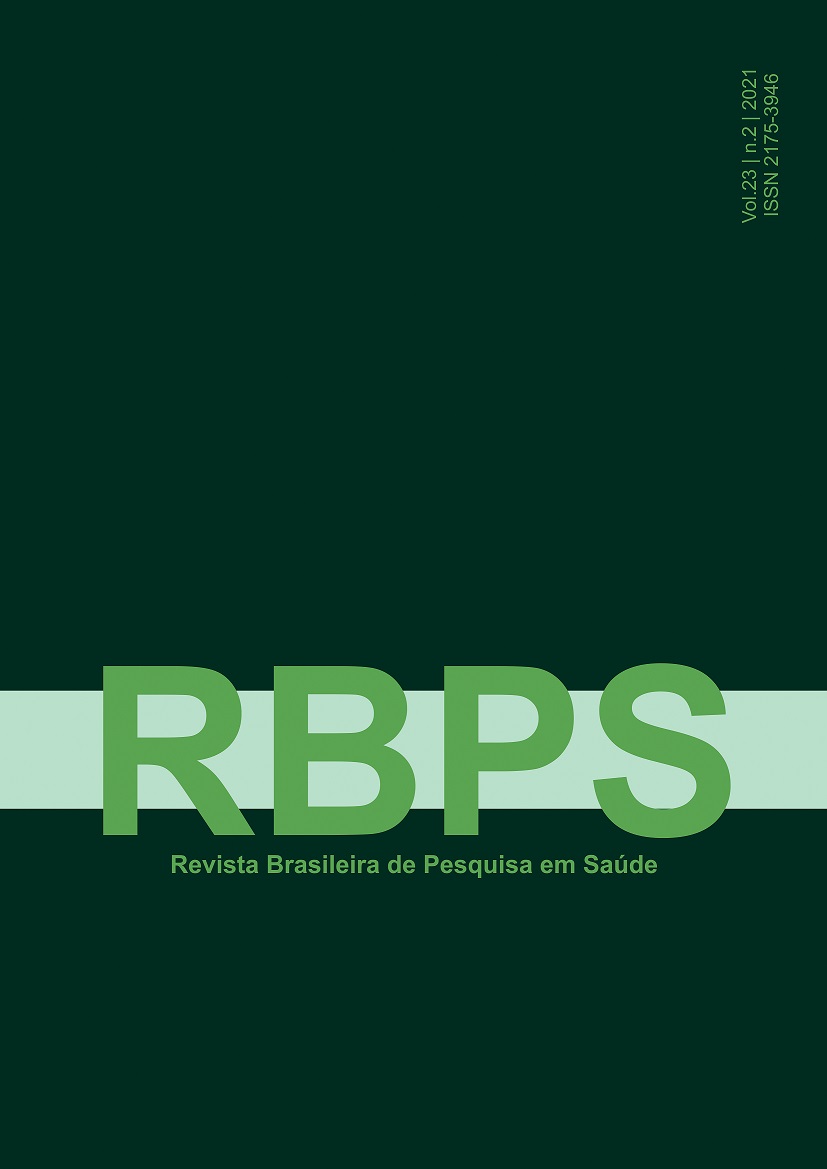Assessment of the mental health of medical students of the Espírito Santo state, Brazil, during social distancing imposed by COVID-19
DOI:
https://doi.org/10.47456/rbps.v23i2.35027Keywords:
Mental Disorders, Coronavirus Infections, Pandemics, Medical StudentsAbstract
Introduction: The coronavirus (COVID-19) has unknown characteristics, with high dissemination and lethality. In this context, containment and distancing measures were enforced to decrease the fast spread of the disease and slow or collapse the health system. Objectives: Review of the impacts of the coronavirus pandemic through the assessment of the mental health of medical students, focusing on anxiety and depression. Methods: Data collection which include medical students from Espirito Santo Universities, from 04/18 to 05/03/2020, through an anonymous online self-completion form, composed of three sections: demographic data and information about coronavirus, Hospital Anxiety and Depression Scale (HAD), behaviour and habilities during the social distancing. Results: The final sample comprised 476 people, 70.2% female and 29.1% male, with a 59.7% predominance in the 21 to 25 age group. According to the Hospital Anxiety and Depression Scale scale, 7.1% likely to experience depression and 36.1% anxiety. The consumption of alcohol and other drugs was reported by 46.3% of the interviewees and 6.1% said they had thought about hurt themselves. Conclusion: The social distancing may contribute to the triggering or intensification of depressive and anxious disorders, as well as an increase in the consumption of alcohol and other drugs. Thus, preventive and supportive measures, during periods of pandemics, are necessary to prevent the illness of medical students and future professionals.
Downloads
References
Sehdev PS. The origin of quarantine. Clin. Infect. Dis.2002; 35(9): 1071-2
Reardon S. Ebola’s mental-health wounds linger in Africa. Nature 2015; 519: 13-4.
Wang C, Pan R, Wan X, Tan Y, Xu L, Ho CS, et al. Immediate psychological responses and associated factors during the initial stage of the 2019 coronavirus disease (covid-19) epidemic among the general population in China. Int J Environ Res Public Health 2020; 17(5).
Pfefferbaum B, North C. Perspective Mental Health and the Covid-19 Pandemic. The New England Journal of Medicine 2020.
Xiang YT, Yang Y, Li W, Zhang L, Zhang Q, Cheung T, et al. Timely mental health care for the 2019 novel coronavirus outbreak is urgently needed. The Lancet Psychiatry 2020; 7(3): 228-9.
Tucci V, Moukaddam N, Meadows J, Shah S, Galwankar SC, Kapur GB. The forgotten plague: psychiatric manifestations of ebola, zika, and emerging infectious diseases.J Glob Infect Dis 2017; 9(4):151-6.
Morens DM, Fauci AS. Emerging infectious diseases: threats to human health and global stability. PLoS Pathog2013; 9(7).
Brooks S, Webster RK, Louise ES,Woodland L, Wesseley S, Greenberg N. et al. The psychological impact of quarantine and how to reduce it: rapid review of the evidence.The Lancet 2020; 395: 912-20.
Ahmed H, Allaf M, Elghazaly H. COVID-19 and medical education. The Lancet Infectious Diseases 2020.
Associação Brasileira de Educação Médica [https:// website.abem-educmed.org.br/]. Resultados preliminares do diagnóstico das escolas médicas na epidemia covid-19 [acesso em 27 mai 2020. Disponível em: https:// website.abem-educmed.org.br/resultadospreliminares-diagnostico-escolas-medicas/.
Lana RM, Coelho FC, Gomes MFC, Cruz OG, Bastos LS, Villela DAM, et al. Emergência do novo coronavírus (SARS-CoV-2) e o papel de uma vigilância nacional em saúde oportuna e efetiva.Cadernos de Saúde Pública 2020; 36(3): 13-36.
Universidade Aberta do Sistema Unico de Saúde [https://www.unasus.gov.br/]. Organização Mundial de Saúde declara pandemia do novo Coronavírus [ acesso em 27 mai 2020]. Disponível em: https://www.unasus.gov.br/ noticia/organizacao-mundial-de-saude-declara-pandemia-de-coronavirus
Ministério da Saúde [homepage na internet]. Atualização diária de Covid-19 do Brasil [acesso em 8 jun 2021]. Disponível em: https://qsprod.saude.gov.br/extensions/ covid-19_html/covid-19_html.html
Lima, RC. Distanciamento e isolamento sociais pela Covid-19 no Brasil: impactos na saúde mental. Physis: Revista de Saúde Coletiva [online]. 2020, 30(2) [Acesso em 4 Julho 2021]. Disponível em: https://doi.org/10.1590/ S0103-73312020300214.
Barros MB, Lima MG, Malta DC, Szwarcwald CL, Azevedo RC, Romero D. et al. Relato de tristeza/ depressão, nervosismo/ansiedade e problemas de sono na população adulta brasileira durante a pandemia de COVID-19. Epidemiol. Serv. Saúde [Internet]. 2020, 29(4): 1-12. Disponível em: http://scielo.iec. gov.br/scielo.php?script=sci_arttext&pid=S1679- 49742020000400021&lng=pt.
Wilder-Smith A, Freedman DO. Isolation, quarantine, social distancing and community containment: pivotal role for old-style public health measures in the novel coronavirus (2019-nCoV) outbreak. J Travel Med. 2020;27(2).
Botega NJ, Bio MR, Zomignani MA, Garcia Jr C., Pereira W. Transtornos do humor em enfermaria de clínica médica e validação de escala de medida (HAD) de ansiedade e depressão. Rev. Saúde Pública. 1995; 29(5); 359-63.
Ornell F, Schuch JB, Sordi AO, Kessler FHP. “Pandemic fear” and COVID-19: mental health burden and strategies. Braz J Psychiatry. 2020.
Bertolote JM., Mello-santos CD, Botega N.J. Detecção do risco de suicídio nos serviços de emergência psiquiátrica. Brazilian Journal of Psychiatry. 2010; 32 (Supl II), S87-S95.
Andrade AG, Duarte PCAV., Oliveira, LG [et al]. I Levantamento Nacional sobre o uso de álcool, tabaco e outras drogas entre universitários das 27 capitais brasileiras. Secretaria Nacional de Políticas sobre Drogas, 2010. Disponível em: https://cetadobserva.ufba.br/es/ publicacoes/i-levantamento-nacional-sobre-uso-de-alcool-tabaco-e-outras-drogas-entre-universitarios
Silva DJ, Vaz AF. A emergência do sujeito cerebral e suas implicações para a educação, Childhood&Philosophy 2016; 12(24): 211-30.
Takei EH, & Schivoletto S. Ansiedade. Revista Brasileira de Medicina. 2000, 57(7), 665-668. [acesso em 28 mai 2020]. Disponível em https://www.scielo.br/scielo. php?script=sci_arttext&pid=S0103-166X2013000100006 &lng=pt&tlng=pt .
Laranjeira R. (Supervisão) [et al.]. II Levantamento Nacional de Álcool e Drogas. Relatório LENAD, 2012. Disponível em: http://inpad.org.br/wp-content/ uploads/2014/03/Lenad-II-Relat%C3%B3rio.pdf.
Nagib MGS, Moreira-Almeida A, Pinsky I, Sanches M, Laranjeira R. Associação Entre Religiosidade E Uso De Álcool Na População Brasileira. UNIAD [periódicos na internet], 2010 [acesso em 27 mai 2020]. Disponível emhttps://www.uniad.org.br/artigos/2- alcool/associacao-entre-religiosidade-e-uso-de-alcool-na-populacao-brasileira/.
Santos HGB, Marcon SR, Espinosa MM, Baptista MN, Paulo PMC. Fatores associados à presença de ideação suicida entre universitários. Rev Latino-Amer Enferm, 2017; 25. Disponível em: http://www.periodicos.usp.br/ rlae/article/view/134940.
Taliaferro LA, Rienzo BA, Pigg JRRM, Miller MD, Dodd VJ. Spiritual Well-Being and Suicidal Ideation Among College Students. J Am College Health. [Internet]. 2009 [Acesso em 27 mai 2020]; 58(1): 164-72. Available from: http:// www.ncbi.nlm.nih.gov/pubmed/19592357. doi: 10.3200/ JACH.58.1.83-90
Oliveira S, Postal E, Afonso D. As Escolas Médicas e os desafios da formação médica diante da epidemia brasileira da COVID-19: das (in)certezas acadêmicas ao compromisso social. APS [revista em Internet], 2020 abr [acesso em 20 abr 2020]; 2(1): 56-0. Disponível em: https://apsemrevista. org/aps/article/view/69.
Santos PZD, Dias JI, Alves RB. Educação permanente sobre a atenção psicossocial em situação de desastres para agentes comunitários de saúde: um relato de experiência. Saúde em Debate, 2020; 43(3), 200-8.
Downloads
Published
How to Cite
Issue
Section
License
Copyright (c) 2022 Revista Brasileira de Pesquisa em Saúde/Brazilian Journal of Health Research

This work is licensed under a Creative Commons Attribution-NonCommercial-NoDerivatives 4.0 International License.
Authors and reviewers must disclose any financial, professional, or personal conflicts of interest that could influence the results or interpretations of the work. This information will be treated confidentially and disclosed only as necessary to ensure transparency and impartiality in the publication process.
Copyright
RBPS adheres to the CC-BY-NC 4.0 license, meaning authors retain copyright of their work submitted to the journal.
- Originality Declaration: Authors must declare that their submission is original, has not been previously published, and is not under review elsewhere.
- Publication Rights: Upon submission, authors grant RBPS the exclusive right of first publication, subject to peer review.
- Additional Agreements: Authors may enter into non-exclusive agreements for the distribution of the RBPS-published version (e.g., in institutional repositories or as book chapters), provided the original authorship and publication by RBPS are acknowledged.
Authors are encouraged to share their work online (e.g., institutional repositories or personal websites) after initial publication in RBPS, with appropriate citation of authorship and original publication.
Under the CC-BY-NC 4.0 license, readers have the rights to:
- Share: Copy and redistribute the material in any medium or format.
- Adapt: Remix, transform, and build upon the material.
These rights cannot be revoked, provided the following terms are met:
- Attribution: Proper credit must be given, a link to the license provided, and any changes clearly indicated.
- Non-Commercial: The material cannot be used for commercial purposes.
- No Additional Restrictions: No legal or technological measures may be applied to restrict others from doing anything the license permits.

























